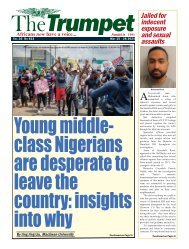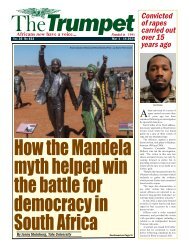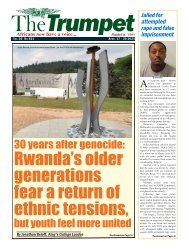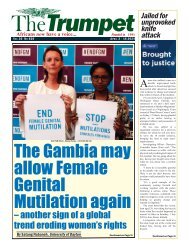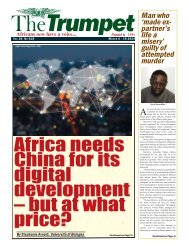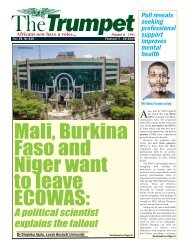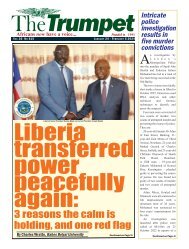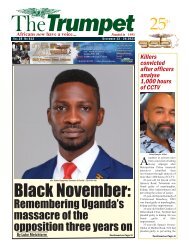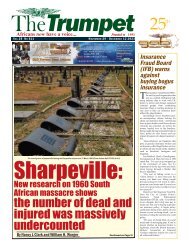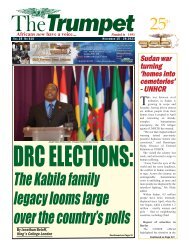The Trumpet Newspaper Issue 619 (March 20 - April 2 2024)
Why children are prime targets of armed groups in Northern Nigeria.
Why children are prime targets of armed groups in Northern Nigeria.
You also want an ePaper? Increase the reach of your titles
YUMPU automatically turns print PDFs into web optimized ePapers that Google loves.
<strong>The</strong><strong>Trumpet</strong><br />
Africans now have a voice... Founded in 1995<br />
V O L 30 N O <strong>619</strong> M A R C H <strong>20</strong> - APRIL 2 <strong>20</strong>24<br />
Nigerian bandits (Photo - Sani<br />
Malumfashi, VOA - WikiCommons<br />
US Public Domain)<br />
Recovery<br />
of 19-yearold’s<br />
body<br />
from River<br />
Thames<br />
sparks<br />
public<br />
outcry<br />
By ‘Femi Okutubo<br />
Why children<br />
are prime<br />
targets of<br />
armed groups<br />
in Northern<br />
Nigeria<br />
By Hakeem Onapajo, Nile University of Nigeria<br />
Continued on Page 3><br />
Samaria Ayanle<br />
(Photo - Metropolitan Police)<br />
Following the recovery of a body<br />
from London’s River Thames<br />
believed to be that of missing<br />
Samaria Ayanle, there has been a<br />
public outcry about how the<br />
University she attended - School of<br />
Oriental and African Studies (SOAS)<br />
University of London, handled<br />
concerns raised by her friends. Her<br />
friends allege that their reports were<br />
met with a ‘standoffish attitude.’<br />
Some members of the public have<br />
also criticised the fact that Samaria’s<br />
disappearance did not gain adequate<br />
mainstream media attention and<br />
publicity till friends took to social<br />
media – with the search for Samaria<br />
subsequently going viral.<br />
Citing a few other cases of<br />
missing persons who were later found<br />
dead after what appears to be a while,<br />
there are accusations that race may<br />
have played a role in what seems to<br />
be a lackadaisical handling and<br />
coverage of the disappearance of<br />
Samaria – a Black African.<br />
<strong>The</strong> public are also critical of the<br />
fact that despite Samaria’s body being<br />
recovered on the same day she<br />
disappeared, it has taken 13 days to<br />
connect the dots.<br />
A statement from London’s<br />
Metropolitan Police said detectives<br />
believe that a body recovered from<br />
Continued on Page 2
News<br />
Page2 <strong>The</strong><strong>Trumpet</strong> MARCH <strong>20</strong> - APRIL 2 <strong>20</strong>24<br />
Recovery of 19-year-old’s body from<br />
River Thames sparks public outcry<br />
Continued from Page 1<<br />
River Thames in February is that of<br />
missing 19-year-old Samaria Ayanle.<br />
Police stated that Samaria was only<br />
first reported missing to police by<br />
University staff on Friday 8 <strong>March</strong>.<br />
An investigation was launched and<br />
CCTV enquiries found that Samaria was<br />
last seen at her university accommodation<br />
near Marble Arch in Central London - in<br />
the early hours of Thursday, 22 February.<br />
Solicitor and Partner<br />
of an award-winning<br />
law firm<br />
S.A.J<br />
LEGAL<br />
based in the heart of<br />
Central London -<br />
Kolade Jegede<br />
specializes in:<br />
Immigration - Preparing of all<br />
Immigration matters, including<br />
Appeal Challenges and Tribunal<br />
Representation.<br />
Employment - Handling all types<br />
of Employment Claims.<br />
Family Law - Dealing with Divorce<br />
Applications, Financial Arrangements,<br />
and Applying for Non-Molestation /<br />
Occupational Orders.<br />
On Thursday, 22 February at 08:19<br />
hours, police were called by a member of<br />
the public to a body on the north<br />
foreshore near Putney Pier. <strong>The</strong> body was<br />
recovered. No personal property was<br />
found.<br />
Officers conducted finger print tests<br />
but these were negative.<br />
Police checked recent missing persons<br />
reports but the body did not match the<br />
description of any other persons reported<br />
missing around that time.<br />
<strong>The</strong> body was sent to the Coroner to<br />
conduct further checks. Meanwhile<br />
details were uploaded onto the UK<br />
Missing Persons database in the hopes the<br />
person might be identified.<br />
After Samaria was reported missing,<br />
Police linked their enquiries to the 22<br />
February discovery on Wednesday, 13<br />
<strong>March</strong>. <strong>The</strong>y have viewed body-worn<br />
video from then and believe the person<br />
found is Samaria. Formal identification is<br />
pending.<br />
Samaria’s death is being treated as<br />
unexplained, pending further enquiries.<br />
A Police statement said: “Samaria’s<br />
family and friends have been informed of<br />
this development. Our thoughts are with<br />
them and we will support them at this<br />
difficult time.”<br />
Anyone with information that could<br />
help police should call 101 ref<br />
01/60807/24. You can also share via<br />
@MetCC on X.<br />
First consultation is FREE.<br />
T: 07818 118656 E: kj@saj.legal
News<br />
MARCH <strong>20</strong> - APRIL 2 <strong>20</strong>24 <strong>The</strong><strong>Trumpet</strong><br />
Why children are prime targets of<br />
Page3<br />
Continued from Page 1<<br />
Due to growing insecurity,<br />
Nigeria is gradually<br />
becoming one of the most<br />
dangerous places to live. <strong>The</strong> <strong>20</strong><strong>20</strong><br />
Global Terrorism Index identified<br />
the country as the third most<br />
affected by terrorism. <strong>The</strong>re was a<br />
sharp increase in Boko Haram’s<br />
targeting of civilians by 25%, and<br />
killings by herdsmen increased by<br />
26%, compared with the previous<br />
year. <strong>The</strong> two countries higher on<br />
the index are Iraq and Afghanistan.<br />
According to the Nigeria<br />
Security Tracker, 2,769 violent<br />
deaths were recorded between<br />
February <strong>20</strong><strong>20</strong> and February <strong>20</strong>21<br />
in Borno State alone. Similarly,<br />
ransom-kidnapping by armed<br />
groups has increased substantially in<br />
the past five years. Over $18 million<br />
was paid as ransom for kidnapped<br />
victims between <strong>20</strong>11 and <strong>20</strong><strong>20</strong>.<br />
While insecurity is common in<br />
Nigeria, the northern region has<br />
been most affected. This is due to<br />
Boko Haram attacks, banditry,<br />
farmers-herdsmen conflicts,<br />
kidnappings and ethno-religious<br />
conflicts. Sadly, children have not<br />
been spared.<br />
In the Northeast, children have<br />
been murdered, abducted and used<br />
as sex slaves, forcefully recruited as<br />
child soldiers, and suffer from<br />
diseases and malnutrition at the<br />
Internally Displaced Persons camps.<br />
<strong>The</strong> United Nations says almost<br />
4,000 children were killed in just a<br />
year, <strong>20</strong>15 to <strong>20</strong>16. UNICEF<br />
reported that an estimated 1.9<br />
million people are displaced – and<br />
about 60% of them are children;<br />
many under the age of five.<br />
<strong>The</strong> rising phenomenon has<br />
further manifested in the recent<br />
wave of attacks on schools and<br />
kidnapping of students.<br />
My research published last year<br />
highlights why children have<br />
become targets for the armed groups<br />
in northern Nigeria. This paper<br />
focuses on children in the Boko<br />
Haram conflict, which has for over<br />
10 years ravaged the north-eastern<br />
part of Nigeria and around Lake<br />
Chad.<br />
armed groups in Northern Nigeria<br />
Despite the reality that children<br />
have increasingly become the face<br />
of insecurity in northern Nigeria, the<br />
literature has been silent on issues<br />
related to child security. My study<br />
therefore aimed to address the<br />
perspective of children in the<br />
conflict.<br />
I found that children were of<br />
strategic interest to both the<br />
terrorists and the State security<br />
forces. I concluded that child<br />
security had not been given<br />
sufficient attention in Nigeria, and<br />
that child security should be<br />
included in peace-building efforts in<br />
northeastern Nigeria.<br />
Children and conflict in<br />
northern Nigeria<br />
<strong>The</strong> dimension of children in<br />
violent conflicts in northern Nigeria<br />
gained momentum in <strong>20</strong>13 when<br />
Boko Haram adopted the strategy of<br />
direct attacks on schools, hospitals<br />
and centres for Internally Displaced<br />
People (IDP).<br />
It started with the midnight raid<br />
of a dormitory in Gujba, Yobe State,<br />
leading to the murder of 44<br />
schoolboys by the terrorist group in<br />
September <strong>20</strong>13. Five months later,<br />
another boarding school was<br />
attacked, and 59 boys were<br />
murdered in the same State. In <strong>April</strong><br />
<strong>20</strong>14, 276 schoolgirls were<br />
abducted in Chibok in Borno State.<br />
UNICEF in its <strong>20</strong>18 report said<br />
that the group had kidnapped over<br />
1,000 children since <strong>20</strong>13. Between<br />
<strong>20</strong>15 and <strong>20</strong>16, the UN estimated<br />
that 3,909 children were killed.<br />
In the past five years, the rise of<br />
banditry added a new and dangerous<br />
dimension to attacks on children.<br />
On December 11 <strong>20</strong><strong>20</strong>, 333 students<br />
were kidnapped in Kankara, Katsina<br />
State. On December <strong>20</strong> <strong>20</strong><strong>20</strong>, 80<br />
students at an Islamic school were<br />
kidnapped in Mahuta, Katsina State.<br />
Twenty seven students were<br />
abducted in Kagara, Niger State, on<br />
February 17 <strong>20</strong>21.<br />
<strong>The</strong> latest occurred on February<br />
25 with the abduction of 317<br />
schoolgirls in Jangebe, Talata-<br />
Mafara local government, Zamfara<br />
State.<br />
Why children are prime<br />
targets<br />
Our study used a qualitative<br />
approach, relying on data from<br />
institutional reports of intergovernmental<br />
agencies like the<br />
United Nations, United Nations<br />
Children’s Fund, and International<br />
Organisation for Migration; nongovernmental<br />
agencies like Human<br />
Rights Watch, Amnesty<br />
International, Global Coalition to<br />
Protect Education from Attack,<br />
Mercy Corps, Open Doors and<br />
media reports.<br />
<strong>The</strong> research showed that<br />
children were of strategic interest to<br />
Continued on Page 4
Page4<br />
<strong>The</strong><strong>Trumpet</strong><br />
<strong>The</strong><strong>Trumpet</strong> Group<br />
Field: 07956 385 604<br />
E-mail:<br />
info@the-trumpet.com<br />
<strong>The</strong><strong>Trumpet</strong>Team<br />
PUBLISHER / EDITOR-IN-CHIEF:<br />
’Femi Okutubo<br />
MARCH <strong>20</strong> - APRIL 2 <strong>20</strong>24<br />
News<br />
Why children are prime<br />
targets of armed groups<br />
in Northern Nigeria<br />
Continued from Page 1<<br />
CONTRIBUTORS:<br />
Moji Idowu, Ayo Odumade,<br />
Steve Mulindwa<br />
SPECIAL PROJECTS:<br />
Odafe Atogun<br />
John-Brown Adegunsoye (Abuja)<br />
DESIGN:<br />
Xandydesigns@gmail.com<br />
ATLANTA BUREAU CHIEF:<br />
Uko-Bendi Udo<br />
3695 F Cascade Road #2140 Atlanta,<br />
GA 30331 USA<br />
Tel: +1 404 889 3613<br />
E-mail: uudo1@hotmail.com<br />
BOARD OF CONSULTANTS<br />
CHAIRMAN:<br />
Pastor Kolade Adebayo-Oke<br />
MEMBERS:<br />
Tunde Ajasa-Alashe<br />
Allison Shoyombo, Peter Osuhon<br />
<strong>The</strong><strong>Trumpet</strong> (ISSN: 1477-3392)<br />
is published in London fortnightly<br />
THINKING<br />
OF<br />
WRITING<br />
A BUSINESS<br />
PLAN?<br />
We can help you develop a<br />
professional business plan<br />
from only £250.<br />
For more information, contact us<br />
at 07402792146 or email us at:<br />
tolu.oyewole@consultant.com<br />
<strong>The</strong> kidnap of the Chibok Girls led to protests around the world including Spain (Photo - HazteOir.org - CCA-SA-2.0)<br />
the armed groups for many reasons.<br />
First, targeting children proved<br />
effective as a tool to negotiate for<br />
the release of members of the group<br />
in prison and receive huge ransoms<br />
to purchase weapons and fund their<br />
operations.<br />
Second, the armed groups were<br />
interested in children to gain local<br />
and international attention to show<br />
their strength, seek international<br />
collaborations with similar groups,<br />
and amplify their demands on the<br />
State authorities.<br />
Third, children were useful for<br />
their military operations, especially<br />
for terrorist groups. <strong>The</strong>y could<br />
plant explosives, act as human<br />
shields or suicide bombers, and spy<br />
on the other parties because they<br />
didn’t arouse suspicion.<br />
Fourth, the attack on schools<br />
corresponded with the central<br />
ideology driving terrorism in the<br />
region, which was based on<br />
opposition to Western education.<br />
<strong>The</strong> increased attacks showed the<br />
plan was to make the region<br />
insecure for teaching and learning.<br />
Fifth, girls were of interest to the<br />
armed groups for sexual<br />
exploitation. Abducted girls were<br />
sometimes raped or forced into<br />
marriages in the camps.<br />
Nigeria must safeguard its<br />
children more<br />
Child security has not been given<br />
sufficient attention in Nigeria. This<br />
explains the successful attacks on<br />
children in recent times. Child<br />
security underscores the essence of<br />
the United Nations Convention on<br />
the Rights of Child, which Nigeria<br />
is a party to.<br />
<strong>The</strong> government must show<br />
serious commitment to children’s<br />
security by tackling the rising<br />
problem of insecurity ravaging the<br />
country. <strong>The</strong> paper underscores the<br />
need for specialised programmes<br />
that can address the peculiar<br />
challenges of children involved in<br />
the conflict zones and not merely<br />
incorporate them into adult-focused<br />
or general programmes.<br />
<strong>The</strong> international community,<br />
including important nongovernmental<br />
organisations<br />
promoting children’s rights and<br />
welfare, must also compel the<br />
authorities to secure the children<br />
and internationalise the problem of<br />
child insecurity in Nigeria.<br />
Hakeem Onapajo is a Senior<br />
Lecturer in the Department of<br />
Political Science and International<br />
Relations at Nile University of<br />
Nigeria.<br />
This article is republished from<br />
<strong>The</strong> Conversation under a Creative<br />
Commons license. Read the original<br />
article<br />
at:<br />
https://theconversation.com/whychildren-are-prime-targets-ofarmed-groups-in-northern-nigeria-<br />
156314
Beauty<br />
MARCH <strong>20</strong> - APRIL 2 <strong>20</strong>24<br />
<strong>The</strong><strong>Trumpet</strong><br />
Vatika Naturals launches<br />
#ROOTFORME campaign to inspire<br />
workplace inclusivity<br />
Page5<br />
House of Dabur’s flagship<br />
brand - Vatika Naturals has<br />
launched<br />
its<br />
#ROOTFORME campaign - a<br />
digital campaign to mark this year’s<br />
International Women’s Day.<br />
#ROOTFORME addresses<br />
intersectionality in the workplace<br />
which affects women of colour,<br />
compounded by race, ethnicity,<br />
religion and several other issues<br />
which can pose as a major roadblock<br />
for career advancement - making<br />
them susceptible to workplace<br />
harassment and stereotyping.<br />
‘Intersectionality’ has its roots in<br />
Black feminist activism and was<br />
originally coined by an American<br />
legal race scholar – Kimberle<br />
Williams Crenshaw in 1989.<br />
Intersectionality is an overlapping of<br />
multiple forms of inequality that<br />
create obstacles for an individual,<br />
that is already at a predisposed<br />
disadvantage.<br />
Redefining<br />
women’s<br />
empowerment this International<br />
Women’s Day, Vatika leads the<br />
conversation with humour to address<br />
workplace stereotypes and<br />
Comediennes - Shazia Mirza and Sikisa<br />
discrimination, through partnerships<br />
with leading stand-up comediennes<br />
like Shazia Mirza and Sikisa. Both<br />
comediennes who come from<br />
backgrounds of ethnic minority have<br />
each faced stereotypes in their own<br />
line to escalation in comedy.<br />
In celebration of the campaign<br />
launch, Business Head of Dabur<br />
International Europe UK - Zakir<br />
Mansoori stated – Vatika Naturals<br />
has been bringing bespoke hair care<br />
solutions to multi-ethnic audiences<br />
around the world for over 35 years<br />
and the brand has been garnering a<br />
lot of love from our loyal base of<br />
customers. Earlier this year we<br />
launched our Afro Naturals range<br />
especially for women with textured<br />
hair. And there is a lot to look<br />
forward to from Vatika, as we<br />
embark on this journey to make the<br />
brand relevant to a wider audience,<br />
which would include new product<br />
launches and newer formulations for<br />
different hair types.<br />
Roshni Singh, House of Dabur’s<br />
Group Marketing Manager UK, EU<br />
& Americas said, “Vatika Naturals is<br />
not just a hair care brand but a<br />
custodian of values which champion<br />
diversity, differences, and<br />
uniqueness especially amongst<br />
women. With the #ROOTFORME<br />
campaign, Vatika endeavours to<br />
further strengthen its stand towards<br />
being inclusive and diverse.”<br />
#RootForMe is a call to action for<br />
individuals to stand together and<br />
dismantle barriers preventing<br />
equality for women and specifically<br />
women of colour. Vatika is always<br />
challenging the status quo or<br />
stereotypes that hinder the growth of<br />
an individual.”<br />
Agency Founder and Chairman<br />
of HereandNow365 - Manish Tiwari<br />
further elucidated that “Vatika<br />
Naturals is a brand which identifies<br />
and celebrates differences, and to<br />
match the brand’s vision, our team<br />
has developed this concept which is<br />
not just clutter-breaking but lighthearted.<br />
<strong>The</strong> aim of deploying<br />
humour is not to make light of the<br />
issues at hand, rather to offer hard<br />
hitting provocative messaging<br />
through treatment and platforms<br />
which resonate with our younger<br />
audiences in today’s time.<br />
Vatika Naturals #RootForMe<br />
<strong>The</strong> two-week campaign<br />
launched across Vatika’s social<br />
media channels on 8th of <strong>March</strong><br />
<strong>20</strong>24 across UK and the USA. To<br />
amplify the message, the brand will<br />
be seen at iconic landmarks like<br />
Times Square, New York city and the<br />
London Underground in the month<br />
of <strong>March</strong>, with the aim of sparking<br />
dialogue around workplace issues,<br />
stereotypes, and navigating these<br />
challenges.<br />
Vatika Naturals has a strong<br />
expertise in inclusive hair care that<br />
harnesses the power of natural<br />
ingredients in their products. <strong>The</strong><br />
products range from shampoos,<br />
conditioners, hair oils, temporary<br />
hair colours, and hair masks; made<br />
with natural led ingredients such as<br />
- Coconut, Olive, Almond, Garlic,<br />
Black Seed, Onion, Egg protein and<br />
many more.<br />
From being a generic hair care<br />
brand for South Asian women, this<br />
year Vatika Naturals is embarking on<br />
a journey to become the preferred<br />
brand by multi-ethnic audiences<br />
across the UK and the USA.
Page6 <strong>The</strong><strong>Trumpet</strong> MARCH <strong>20</strong> - APRIL 2 <strong>20</strong>24<br />
Opinion<br />
New Justices of the<br />
Supreme Court<br />
When Justice Olukayode<br />
Ariwooola, Chief Justice of<br />
Nigeria (CJN) retires from<br />
the Bench in <strong>20</strong>24, upon the<br />
attainment of the statutory, mandatory<br />
retirement age of 70 years, he would<br />
be able to count among his legacies,<br />
as CJN, the singular fact that it was<br />
under his watch that the Supreme<br />
Court achieved the full complement of<br />
21 Justices as required by law. Section<br />
230(2) (b) of the 1999 Constitution<br />
states that “the Supreme Court of<br />
Nigeria shall consist of such number<br />
of Justices not exceeding 21 as may<br />
be prescribed by an Act of the<br />
National Assembly.” By February<br />
<strong>20</strong><strong>20</strong>, the number of Justices left on<br />
the Supreme Court was 13. One after<br />
the other, their Lordships retired:<br />
Justice Paul Galumje retired in <strong>20</strong><strong>20</strong>,<br />
Justice Sylvester Ngwuta died while<br />
still in service in <strong>March</strong> <strong>20</strong>21 - three<br />
weeks to his 70 th birthday, Justice<br />
Olabode Rhode-Vivour retired in<br />
<strong>20</strong>21, Justice Mary Odili in <strong>20</strong>22,<br />
Justice Ejembi Eko in <strong>20</strong>22, Justice<br />
Tanko Muhammad resigned abruptly<br />
in <strong>20</strong>23, Justice Amina Augie retired<br />
in <strong>20</strong>23, and Justice Musa Dattijo<br />
Muhammed in <strong>20</strong>23, Justice Chima<br />
Cletus Nweze - due to retire in <strong>20</strong>28<br />
died in July <strong>20</strong>23. By October <strong>20</strong>23,<br />
the number of Supreme Court Justices<br />
had dropped to an unprecedented, alltime<br />
low number of 10. Those<br />
vacancies have now been filled. It is a<br />
historic, welcome development and<br />
beyond the Bench itself, an<br />
achievement for the Bola Ahmed<br />
Tinubu administration.<br />
<strong>The</strong> extant Revised NJC<br />
Guidelines and Procedural Rules for<br />
the Appointment of Judicial Officers<br />
of all Superior Courts (<strong>20</strong>14), and the<br />
<strong>20</strong>16 National Judicial Policy define<br />
the processes for the appointment of<br />
such officers - nominations from a<br />
broad spectrum of persons and<br />
officials are required but for some<br />
reason, there was never a full<br />
complement of Supreme Court<br />
Justices under the Buhari<br />
administration. Sometime in <strong>20</strong>19,<br />
President Buhari had in fact asked the<br />
then acting CJN, Justice Tanko<br />
Muhammad to initiate the process of<br />
filling the vacancies on the Supreme<br />
Court Bench. This caused a little<br />
furore, the nomination of judges not<br />
being the function of the Executive.<br />
<strong>The</strong> integrity of the process was the<br />
issue. When the NJC went ahead to<br />
obey the Presidential directive and<br />
recommended the appointment of four<br />
new Supreme Court Justices, and sent<br />
the list to President Buhari, a civil<br />
society group, Access to Justice went<br />
to court. We need not allow the history<br />
Justice Olukayode Ariwooola - Chief Justice of Nigeria<br />
of the relationship between the Buhari<br />
administration and the judiciary to<br />
detain us in this present enquiry,<br />
however. It is enough to say that at<br />
those times, <strong>20</strong>15 – <strong>20</strong>23, the<br />
relationship between the judiciary and<br />
the Executive arms of government<br />
were in turns adversarial and<br />
complementary. Buhari was the first<br />
President to allocate the largest<br />
amount of funding to the judiciary, but<br />
it was also in those days that it became<br />
common for the houses of Judges to<br />
be raided at midnight. Justice Walter<br />
Onnoghen was suspended as CJN,<br />
and forced to retire before his time.<br />
His replacement, Justice Tanko<br />
Muhammad was also forced to retire<br />
prematurely. <strong>The</strong> Buhari<br />
administration routinely disobeyed<br />
court orders and violated the rule of<br />
law. In <strong>20</strong>16, two Justices of the<br />
Supreme Court were appointed under<br />
the Buhari administration -Justices<br />
Ejembi Eko and Amina Augie, and in<br />
<strong>20</strong><strong>20</strong> four Justices - Tijanni Abubakar,<br />
Mohammed l. Garba, Abdu Aboki and<br />
Mohammed M. Saulawa; but at no<br />
time since 1999 did the Supreme<br />
Court reach its full complement.<br />
This has now happened with the<br />
swearing in, a week ago, of additional<br />
11 Justices of the Supreme Court:<br />
Haruna Tsammani (North East),<br />
Jamilu Tukur (North West), Abubakar<br />
Umar (North West), Jummai Sankey<br />
(North Central), Mohammed Idris<br />
(North Central), Stephen Adah (North<br />
Central), Moore A. Adumein (South<br />
South), Chidiebere Uwa (South East),<br />
Chioma Nwosu-Iheme (South East)<br />
Obande Ogbuniya (South East) and<br />
Habeeb Adewale Abiru (South West).<br />
<strong>The</strong>se were the 11 that made it to the<br />
Supreme Court out of the 22 that were<br />
originally shortlisted and screened by<br />
the National Judicial Council on 28 th<br />
BY REUBEN ABATI<br />
November <strong>20</strong>23, divided then into<br />
priority and reserved candidates. <strong>The</strong><br />
final list has 10 of the priority<br />
candidates and one that was reserved<br />
- Justice Chioma Nwosu-Iheme. It is<br />
most appropriate to congratulate their<br />
Lordships on their elevation to the<br />
apex Court. It is a great honour and an<br />
accomplishment of no small measure<br />
to sit on the highest court in the land.<br />
<strong>The</strong> CJN underlined this when he told<br />
the 11 Justices that they should see<br />
themselves as “God’s representatives<br />
on earth.” He told them that they<br />
should not seek to please everyone:<br />
“the only deity you can fear is the<br />
Almighty God. Once your judgment is<br />
in consonance with what God expects<br />
from you, and is also in accordance<br />
with the Constitution, you should<br />
consider yourself the happiest and<br />
freest person on earth. Your moral<br />
uprightness, integrity and respect for<br />
the Constitution and other extant laws<br />
in operation, must be unwavering and<br />
unassailable. Any judgement given at<br />
this level can only be upturned in<br />
heaven.”<br />
In those words, CJN Olukayode<br />
Ariwooola reminded the JSCs of the<br />
role of the judex, and the high<br />
responsibility upon their shoulders.<br />
<strong>The</strong>y are expected to be above board<br />
like Caesar’s wife, to dispense justice<br />
without fear or favour not minding<br />
whose ox is gored. <strong>The</strong>se 11 Justices<br />
are taking their seats on the Supreme<br />
Court Bench at a time when the<br />
reputation of the Nigerian judiciary,<br />
including the apex court has received<br />
so much bashing, and there is a lot of<br />
cynicism about our judges among the<br />
populace. Today, not many would<br />
agree with CJN Ariwoola that<br />
Nigerian judges at any level are God’s<br />
representatives on earth, or that they<br />
have any clue about what God expects<br />
from them. <strong>The</strong> CJN could have<br />
offered his guidance without dragging<br />
God into the matter. But he was right<br />
to have suggested that all eyes will be<br />
on the apex court, especially the eyes<br />
of Nigerian politicians who think that<br />
part of their mission should be to steal<br />
the votes and also influence the<br />
Continued on Page 7
Opinion<br />
MARCH <strong>20</strong> - APRIL 2 <strong>20</strong>24 <strong>The</strong><strong>Trumpet</strong><br />
Page7<br />
Court<br />
Continued from Page 6<<br />
judges. <strong>The</strong> eyes of lawyers will also<br />
be on the new Justices, who are<br />
already known, but in terms of how<br />
their elevation and having a full<br />
complement of the judex on the apex<br />
Bench would affect the dispensation<br />
of justice and enrich jurisprudence.<br />
<strong>The</strong> key concern about the<br />
depletion of the apex court was that<br />
the dockets were full, the court was<br />
over-congested with cases, and the<br />
Justices, so few in number, were<br />
overworked. <strong>The</strong>y were also<br />
underpaid and under-resourced as<br />
Justice Musa Dattijo Muhammad<br />
pointed out in his somewhat histrionic<br />
valedictory speech in October <strong>20</strong>23.<br />
With the apex court now having 21<br />
Justices, it means more cases can be<br />
heard and there can be a better rate of<br />
performance and efficiency. But for<br />
this to happen, however, the<br />
administrative processes at our<br />
Supreme Court also need to be<br />
overhauled and modernized. <strong>The</strong>re is<br />
too much clumsiness that is advertised<br />
up there. Many cases that need not go<br />
all the way to the Supreme Court<br />
show up there. This should be a<br />
proper policy court, not an “orisirisi<br />
court”. It must be possible to have a<br />
strong, pro-active Registry of the<br />
Supreme Court that rejects cases that<br />
do not belong there. <strong>The</strong> Supreme<br />
Court’s original and inherent<br />
jurisdiction should be clear enough.<br />
Many lawyers have had to go to the<br />
Supreme Court only to be told that the<br />
Justices are away for another function,<br />
or that the matter should not have<br />
been brought there in the first place.<br />
In the age of telephony and modern<br />
communication, that is scandalous.<br />
<strong>The</strong> Supreme Court must become a<br />
21 st Century Court by deploying<br />
technology to aid its processes and by<br />
learning the best lessons from other<br />
jurisdictions. Any counsel that files<br />
any incompetent or frivolous matter or<br />
tries to waste the time of the court<br />
must be promptly sanctioned. <strong>The</strong>se<br />
days, there is too much indiscipline by<br />
lawyers that is condoned by the Bench<br />
at all levels.<br />
<strong>The</strong> 11 new Justices were said to<br />
have gone through screening by the<br />
Department of State Services (DSS).<br />
I think it is scandalous that potential<br />
Justices of the Supreme Court have to<br />
be screened by the DSS, which in the<br />
New Justices of the Supreme<br />
books has absolutely no role in the<br />
nomination or appointment of Judges.<br />
<strong>The</strong> very suggestion that the Nigerian<br />
judiciary can throw up any persons<br />
who can rise through the system and<br />
act as judges for years, only to be<br />
investigated for any form of wrongdoing<br />
at the point of elevation to the<br />
apex court is scary. But in any case,<br />
all the Justices reportedly passed the<br />
test and they were unanimously<br />
cleared by the Senate of the Federal<br />
Republic via the instrumentality of a<br />
voice vote. I think the rubber-stamp<br />
role of the Senate in the process<br />
should also be reviewed. In other<br />
jurisdictions, such as the United<br />
States, Justices don’t just get to the<br />
Supreme Court. <strong>The</strong>y are subjected to<br />
rigorous public scrutiny and may be<br />
rejected or withdrawn. Public<br />
hearings are held, the nominees are<br />
interrogated. <strong>The</strong>ir previous<br />
judgements are scrutinized to<br />
determine their scope, ideological<br />
bent and contributions to<br />
Constitutional doctrine. <strong>The</strong>ir<br />
academic qualifications are carefully<br />
re-examined too. Students of<br />
comparative legal systems will<br />
remember the case of Justice Clarence<br />
Thomas and the sexual harassment<br />
testimony of Anita Hill in 1991, as<br />
well as the objection of Democrats to<br />
Justice Robert Kavanaugh, and the<br />
Supreme Court of Nigeria<br />
febrile public hearings that attended<br />
his screening in <strong>20</strong>18. <strong>The</strong>re is also<br />
the recent case of Ketanji Brown<br />
Jackson, the first Black woman to<br />
serve as a Justice of the United States<br />
Supreme Court. She did not get there<br />
because of her colour or gender. Her<br />
confirmation hearings were heated<br />
and contentious.<br />
Here in Nigeria, once you make<br />
the NJC final list, you are already on<br />
the Bench. We need to review the<br />
process and allow public hearings. In<br />
the course of the review of litigations<br />
after the <strong>20</strong>23 General Elections,<br />
questions were raised about the work<br />
of at least two of the 11 Justices who<br />
are now on the Supreme Court Bench:<br />
Justice Moore Adumein in the <strong>20</strong>23<br />
Kano Gubernatorial election case, and<br />
Justice Chioma Nwosu-Iheme whose<br />
nomination was openly questioned by<br />
Senator Elisha Abbo. It would have<br />
been good for their Lordships to be<br />
asked for example to respond to the<br />
allegations and insinuations about<br />
their professionalism.<br />
It is also not a good thing that<br />
elevation to the highest judicial seat in<br />
the country has been reduced to<br />
geography and promotion. <strong>The</strong>re has<br />
been some talk about how the<br />
appointments show diversity - that is<br />
geography. Every geopolitical zone is<br />
now well represented at the Supreme<br />
Court Bench. It must be said that<br />
Supreme Court Justices are not quota<br />
representatives. <strong>The</strong>y are to be chosen<br />
on the basis of merit, character and<br />
proven contributions to law. <strong>The</strong><br />
notion that Justices of the Court of<br />
Appeal are entitled to be promoted to<br />
the highest court in the land is wrong.<br />
I find strong merit in the<br />
recommendation that the Supreme<br />
Court Bench should be made open to<br />
Senior Advocates of Nigeria of great<br />
distinction and academics to deepen<br />
the knowledge and expertise base of<br />
the court. <strong>The</strong> Supreme Court must<br />
not be turned into a secret society or a<br />
retirement zone for Justices of the<br />
Court of Appeal. In <strong>20</strong>17, the Nigerian<br />
Bar Association nominated nine of its<br />
Continued on Page 8
Court<br />
Continued from Page 7<<br />
members for the Supreme Court seat<br />
but they were ignored. <strong>The</strong><br />
appointment of judges must be<br />
reformed. And that would not be new:<br />
Justices Teslim Elias and Augustine<br />
Nnamani got to the Supreme Court<br />
through academia and the Bar. In<br />
Canada, this widening of the pool that<br />
we recommend is standard practice.<br />
<strong>The</strong> big elephant in the room is<br />
jurisprudence. One of the major<br />
concerns about Nigeria’s Court of<br />
Appeal is that it had become a court<br />
of technicalities, with the judex<br />
determining cases on convenient<br />
technical grounds rather than the<br />
higher ground of judicial activism.<br />
With the new Justices of the Supreme<br />
Court coming directly from that court,<br />
it is hoped that they would not bring<br />
their over-reliance on technicalities to<br />
the Supreme Court. Once upon a time,<br />
especially during the golden era of<br />
Justices Kayode Eso, Chukwudifu<br />
Oputa, Augustine Nnamani, Ayo<br />
Irikefe, Anthony Aniagolu, Andrew<br />
Obaseki, Adolphus Karibi-Whyte,<br />
Alfa Belgore Muhammadu Uwais,<br />
Mohammed Bello … Nigeria<br />
witnessed some of the most rigorous<br />
applications of the law and the<br />
delivery of justice, even under the<br />
military, and court judgements by<br />
their Lordships were profound<br />
exercises in law, language, philosophy<br />
and wit. Over the years, the standards<br />
collapsed, as court judgements were<br />
reduced to a simple summary of<br />
pleadings and a casual<br />
pronouncement of decisions – a<br />
frightening indication of how robust<br />
craft and sound reasoning had<br />
disappeared from our courts. Most<br />
students of the law would like to see a<br />
return to the good old days not just at<br />
the apex court, but within the entire<br />
judiciary, which in itself is in urgent<br />
need of reform.<br />
With the current talk about<br />
reconfiguration, decentralization and<br />
Page8 <strong>The</strong><strong>Trumpet</strong> MARCH <strong>20</strong> - APRIL 2 <strong>20</strong>24<br />
Opinion<br />
New Justices of the Supreme<br />
restructuring, whichever phrase suits<br />
our fancy, the Nigerian judiciary is<br />
also in urgent need of reconfiguring.<br />
<strong>The</strong>re is too much power in the hands<br />
of the Chief Justice of Nigeria who in<br />
addition to being CJN, is also Chair of<br />
the National Judicial Council (NJC),<br />
Chair of the National Judicial Institute<br />
(NJI), Chair of the Legal Practitioners<br />
Privileges Committee (LPPC) and<br />
Chair of the Federal Judicial Service<br />
Commission (FJSC). <strong>The</strong> military<br />
after a fashion may have imagined<br />
that the head of the country’s judiciary<br />
should also be an overlord like them,<br />
but that has to change: the office of the<br />
CJN must not possess the powers of<br />
an Emperor or what Yorubas call<br />
“Kabiyesi”, that is a traditional<br />
monarch, who represents God on<br />
earth! <strong>The</strong> NJC should be unbundled.<br />
<strong>The</strong> CJN must be a democrat within<br />
the system. It should also not be the<br />
duty of the NJC to appoint and<br />
discipline judges or to appoint Chief<br />
Judges of the States. <strong>The</strong>re have been<br />
calls as well for the de-centralization<br />
of the Supreme Court for more<br />
effective administration of justice,<br />
with the apex court having divisions<br />
in the country’s six geopolitical zones<br />
like the Appeal Court.<br />
While the pros and cons of that<br />
suggestion may be a different kettle of<br />
fish altogether, the immediate<br />
expectation is that a full Supreme<br />
Court would have all its court rooms<br />
functioning and that the new Justices<br />
will enrich our jurisprudence and help<br />
the apex court achieve its full<br />
potential. Even with these new<br />
appointments, more Justices of the<br />
Supreme Court will also soon retire.<br />
<strong>The</strong>re should be no delays in filling<br />
whatever vacancies may arise. At an<br />
individual level, each one of the<br />
Justices has a duty and a responsibility<br />
to prove his or her mettle. Welcome<br />
on board, your Lordships…
Opinion<br />
Ningi’s “mischief” and<br />
Budget <strong>20</strong>24<br />
MARCH <strong>20</strong> - APRIL 2 <strong>20</strong>24<br />
<strong>The</strong><strong>Trumpet</strong><br />
Page9<br />
By Reuben Abati<br />
Senator Abdul Ahmed Ningi (PDP,<br />
Bauchi Central) is a ranking<br />
member of Nigeria’s National<br />
Assembly. He has been a member of that<br />
Assembly since the return to democratic<br />
rule in 1999, first as a member of the<br />
House of Representatives - elected in<br />
1999, re-elected in <strong>20</strong>03 and re-elected<br />
again in <strong>20</strong>07. In <strong>20</strong>11, he continued his<br />
legislative career as a Senator of the<br />
Federal Republic representing Bauchi<br />
Central. He was re-elected in that<br />
capacity in <strong>20</strong>15, <strong>20</strong>19, and <strong>20</strong>23. In the<br />
course of what is an obviously rich and<br />
fulfilling time in the National Assembly,<br />
Ningi has served as either Chairman or<br />
member of many committees including<br />
the Niger Delta Committee, Solid<br />
Minerals, Teachers Education, and<br />
NAFDAC Committee of the House.<br />
Between 1999 and <strong>20</strong>02, he was<br />
Chairman of the Nigeria Football<br />
Association. He would later become<br />
House Majority Leader, <strong>20</strong>03 – <strong>20</strong>07,<br />
and Chairman of the ad hoc committee<br />
on the Niger Delta crisis, the committee<br />
on Jos crisis, and the Constitutional<br />
Review Committee. In <strong>20</strong>11, he won<br />
election into the Senate and emerged as<br />
the Deputy Majority Leader, the Senate<br />
was then dominated by the PDP. He has<br />
been in the Senate since then.<br />
Thus, as far as experience goes,<br />
Ningi is one of the most experienced and<br />
most durable lawmakers in Nigeria<br />
today. His continual re-election shows<br />
that he is well appreciated by the people<br />
of Ningi, his constituency and Bauchi<br />
Central in general. As a person, he is a<br />
friendly, avuncular fellow with friends<br />
across the landscape and a charming<br />
sunny disposition. He is what you can<br />
call a very nice guy. But over the<br />
weekend, it would appear that Senator<br />
Ningi put a stain, perhaps inadvertently,<br />
on his otherwise sterling legislative<br />
credentials, when he alleged in his<br />
position as the Chairman of the Northern<br />
Senators Forum (NSF) that (i) President<br />
Bola Tinubu is implementing a version<br />
of the <strong>20</strong>24 Budget that is different from<br />
what was passed by the National<br />
Assembly, and (ii) that budgetary<br />
allocations for projects and social<br />
infrastructure were skewed against the<br />
North in favour of the South. Was Ningi<br />
speaking for himself, or for Northern<br />
Senators as a group? Ningi alleges that<br />
the Budget that was passed in December<br />
<strong>20</strong>23 was padded with N3 trillion, a<br />
budget of N25 trillion that suddenly<br />
became N28 trillion, and that out of the<br />
total, the Senate President inserted<br />
projects worth N4 trillion into the<br />
Budget, with “huge damage” done to the<br />
North. It will be recalled that President<br />
Tinubu presented a budget estimate of<br />
N27 trillion to the National Assembly on<br />
November 28, <strong>20</strong>23. <strong>The</strong> National<br />
Assembly eventually passed a Budget of<br />
N28.7 trillion, effective January 1, <strong>20</strong>24.<br />
Four Senators have since dismissed<br />
Ningi’s claims as baseless and<br />
unfounded - Senator Sunday Karimi<br />
(APC, Kogi West), Titus Zam (APC,<br />
Benue North West), Kaka Shehu (APC,<br />
Borno Central) and Senator Ibrahim<br />
Jimoh (APC, Ondo South) who insist<br />
that Ningi is misinforming the public.<br />
<strong>The</strong> Chairperson of the Senate<br />
Committee on Media and Public Affairs,<br />
Senator Yemi Adaramodu has also<br />
issued a statement to the effect that there<br />
was no budget padding, no varied<br />
execution, and the budget is a public<br />
document. Further, there are indications<br />
that when the Senate meets today,<br />
Tuesday, <strong>March</strong> 12, Senator Abdul Ningi<br />
would be called upon by his colleagues<br />
Senator Abdul Ahmed Ningi<br />
to defend his allegations, failing which<br />
he may be suspended under Order 67(4)<br />
of the Rules. Indeed, it is necessary to<br />
ask Senator Ningi to prove his own<br />
claims and provide relevant evidence,<br />
before his own colleagues. He is said to<br />
have back-tracked with an explanation<br />
that he was misquoted. He has to prove<br />
how that happened. It is a trite principle,<br />
and this needs not be explained to<br />
lawmakers that he who alleges must<br />
prove. Besides, the allegations are so<br />
weighty and capable of throwing the<br />
country into chaos and strife, that the<br />
Nigerian people need to know.<br />
In one broad stroke, the statements<br />
attributed to Senator Ningi call the<br />
integrity of the National Assembly, the<br />
Senate, and the Tinubu administration<br />
into question. <strong>The</strong> Budget is a creation<br />
of law, that is why it is called the<br />
“Appropriation Act”. If the National<br />
Assembly made two different laws<br />
detailing the fiscal map for the year, one<br />
of which is unknown to the people, that<br />
would not only be illegal, it would be<br />
criminal. Where did the N25 trillion<br />
Budget come from and how did it<br />
become N28 trillion? Where was it<br />
discussed? Who signed it into law? And<br />
what are the details of the<br />
implementation of that secret Budget?<br />
Senator Ningi owes us a duty to unveil<br />
that which is unknown. He says the<br />
Budget was padded. How? It is the duty<br />
of lawmakers to receive the Budget and<br />
go through it line by line, item by item,<br />
before approving it. What is called<br />
budget padding is actually a way of<br />
saying that both the Appropriation<br />
Committee and the entire Senate are<br />
made up of idiots. It amounts to selfindictment.<br />
And where was Senator<br />
Ningi when the Budget was being<br />
padded as he claims? Was he asleep or<br />
awake at the time? And why is he just<br />
speaking up now?<br />
He says “huge damage” has been<br />
done to the North in the Budget. He must<br />
be made to prove how. This kind of<br />
statement is potentially divisive and<br />
capable of causing chaos. It is even<br />
careless in the extreme for Senator<br />
Ningi, an opposition politician, to play<br />
such a divide and rule card. Even when<br />
politicians disagree with the government<br />
of the day, they must be careful not to<br />
burn down the country. This is the key<br />
lesson here. Experience may not<br />
necessarily mean maturity. <strong>The</strong>re was<br />
once a Senator in Nigeria who went<br />
about preaching the importance of<br />
commonsense. Opposition politicians<br />
must learn to play the politics of<br />
commonsense. <strong>The</strong> general elections<br />
ended in <strong>20</strong>23. We are now in the season<br />
of governance, when we must all put<br />
Nigeria first. Politicians must be careful<br />
what they say. Ningi may want to<br />
discredit the Tinubu administration but<br />
he must do so, based on empirical facts<br />
and not in a manner that puts the same<br />
country that has been so generous to<br />
him, at risk. We are told that tension has<br />
gripped the Senate: the very reason why<br />
Ningi’s claims must be investigated and<br />
he must be made to prove his allegations<br />
in the open court of the Senate. His<br />
allegations cannot be covered by<br />
privilege, and must not be swept under<br />
the carpet.<br />
Other members of the Northern<br />
Senators Forum, a body that we assume<br />
includes other members from both the<br />
ruling party and the opposition also have<br />
a duty to tell us what exactly transpired.<br />
Is Ningi speaking for them or is he just<br />
on his own? One by one, every member<br />
Continued on Page 10
Page10 <strong>The</strong><strong>Trumpet</strong> MARCH <strong>20</strong> - APRIL 2 <strong>20</strong>24<br />
Opinion<br />
Ningi’s “mischief” and<br />
Budget <strong>20</strong>24<br />
By Reuben Abati<br />
Continued from Page 9<<br />
of that body must tell us where he or she<br />
stands! For them, it must be a matter of<br />
honour. Senator Ningi granted an<br />
interview to BBC Hausa and he spoke in<br />
Hausa. After a fashion, he may come<br />
forward to say that what he actually said<br />
was lost in translation or that he was<br />
quoted out of context by journalists. One<br />
of the crass games that Nigerian<br />
politicians play, even in the face of<br />
overwhelming evidence, when they are<br />
caught out, is to blame the media.<br />
Ningi’s statements in BBC Hausa must<br />
be played on the open floor of the<br />
Senate. Language experts, and other<br />
speakers of the language must be asked<br />
to review it. Nigeria is too important to<br />
be derailed on the basis of partisanship<br />
or rumours. If it is then established that<br />
Senator Ningi spoke out of mischief,<br />
every Senator not being entitled to<br />
immunity under our laws, the<br />
appropriate punishment for the Senator<br />
should not be under the Senate Rules –<br />
Order 67(4). When Senator Ovie Omo-<br />
Agege was suspended for 90 days under<br />
that same rule, he went to court, and he<br />
won. Just in case Senator Ningi is found<br />
to be fibbing, and unable to prove his<br />
grave allegations, he an Abdul, and an<br />
Ahmed, lying in the Holy Month, should<br />
be punished under the laws of the Sharia<br />
which apply in his home State of Bauchi,<br />
and whatever punishment the Court<br />
deems fit, should be applied publicly and<br />
televised! Even if he insists that he was<br />
misquoted, that too should be<br />
investigated. I don’t want to imagine<br />
what indictment or punishment may<br />
come the Senator’s way under the<br />
Sharia, for he is all things considered,<br />
ordinarily, a nice guy. But this is a matter<br />
that concerns us all.<br />
II:<br />
Third Mainland Bridge - What I<br />
saw<br />
I travelled between the Island and the<br />
Mainland in Lagos taking the Third<br />
Mainland Bridge. <strong>The</strong> 11.8 km Bridge<br />
had been shut down for repairs since<br />
Tuesday, January 9 according to an<br />
announcement by the Federal Ministry<br />
of Works. We were told that the Bridge<br />
would be open for Mainland inbound<br />
Island travels between 12 am to 12 noon,<br />
while those travelling from the island to<br />
the mainland should go through Eko<br />
Bridge, and only use the Third Mainland<br />
Bridge from 12 noon. I was very<br />
skeptical.<br />
On many occasions in the last eight<br />
years, the same Bridge had been shut<br />
down for rehabilitation at various<br />
occasions, either to fix the ramps or<br />
some engineering defects. Lagosians<br />
paid the price in terms of time lost to<br />
traffic hold ups on the alternative routes,<br />
and the hardship of commuting in a city<br />
where the island seems to be the centre<br />
of gravity. Despite the various delays of<br />
the past, the Bridge remained largely a<br />
poor stretch of road. <strong>The</strong> potholes never<br />
seemed to disappear. <strong>The</strong>re was even a<br />
time this same Bridge was vibrating and<br />
you could feel it. <strong>The</strong> rails had been<br />
removed in parts. <strong>The</strong> managers of the<br />
road provided street lights at a point, but<br />
those lights didn’t function for up to a<br />
month. Based on past experience, I was<br />
convinced that the Tinubu administration<br />
and the team at the Federal Ministry of<br />
Works were back to their old game. But<br />
this time around, I was mistaken. My<br />
skepticism is misplaced.<br />
Having confirmed that it was now<br />
possible to take the same route from 12<br />
noon to the Mainland, the other day, I<br />
shrugged off the stress of more than a<br />
month and headed towards the<br />
Mainland. I saw busy workers on the<br />
Mainland-bound side of the Bridge, but<br />
in a short while we were diverted to the<br />
other side which had been completed to<br />
some degree. I became excited. <strong>The</strong><br />
other side of the Bridge had been<br />
thoroughly resurfaced, not the patchpatch<br />
work that we used to see oh, a<br />
complete make-over, and as we drove<br />
towards the Mainland, there was no<br />
vibration. No potholes. Even the lanes<br />
were properly marked with fresh, clean<br />
paint – black and white, and I saw<br />
painters giving the entire stretch of the<br />
Bridge a decent face lift. I didn’t know<br />
when I told the driver: “Wonders! In this<br />
same country? You mean this is<br />
possible?”<br />
We had a very smooth ride all the<br />
way to Oworonshoki, where again there<br />
was another diversion towards Oshodi.<br />
But I had seen enough to justify my<br />
excitement. I noticed though that the<br />
lights had not been fixed – I hope they<br />
would get to that, and that all the broken<br />
rails will be restored. We may raise<br />
questions about cost later, and the<br />
Federal Ministry of Works must be<br />
prepared for that, but with what I saw, I<br />
believe that when that Bridge is fully<br />
rehabilitated, the people of Lagos would<br />
have every cause to thank the Tinubu<br />
administration for a job well done.<br />
Speaking for myself, I do not mind even<br />
if that Bridge is shut down for another<br />
two months until the make-over is<br />
properly done. This time around, the<br />
government seems to be doing a good<br />
job. You may not understand but those<br />
who know the way things are in this<br />
country will get the message: travelling<br />
on a good road in Nigeria is so unusual<br />
it calls for excitement, if not celebration.<br />
STALLIONS AIR<br />
Ipanema Travel Ltd<br />
AFRICA FLIGHTS<br />
SPECIALISTS<br />
LAGOS fr £477<br />
(2 Bags)<br />
0<strong>20</strong> 7580 5999<br />
07979 861 455<br />
Call AMIT / ALEX<br />
73 WELLS ST, W1T 3QG<br />
All Fares Seasonal<br />
ATOL 9179<br />
Commissioned in 1980 by the Shehu<br />
Shagari administration and completed<br />
for public use by President Ibrahim<br />
Babangida in 1990, the Third Mainland<br />
Bridge is the longest bridge linking the<br />
Mainland to Lagos Island. <strong>The</strong> two<br />
others are Eko and Carter Bridges. Since<br />
<strong>20</strong>12, the Bridge has been having issues;<br />
it is either it vibrates, or there are visible<br />
cracks on it, so wide the water below<br />
could be seen, it would in due course<br />
become a preferred spot for those<br />
seeking to commit suicide, which is why<br />
I think the side rails need to be raised so<br />
high that it should be impossible for<br />
anyone to jump into the Lagoon below<br />
by climbing over the barricades. In <strong>20</strong><strong>20</strong>,<br />
the Bridge was even closed for repairs<br />
for six months, and again in <strong>20</strong>21. But<br />
for the first time, I see much<br />
improvement.<br />
I am tempted to think that this<br />
difference can be traced to the fact that<br />
the current Minister of Works, Senator<br />
David Umahi, former Governor of<br />
Ebonyi State is a Civil Engineer. This is<br />
precisely what we mean when we say<br />
that President Tinubu and governments<br />
at all levels must learn to put round pegs<br />
in round holes. If you appoint an<br />
accountant to supervise a construction<br />
project, he is not likely to know what it<br />
entails to build a road. He would be<br />
looking at figures and fail to see the<br />
road. Senator David Umahi, as a former<br />
CEO of an Engineering Company knows<br />
all the details about construction from<br />
design to finish. No contractor or official<br />
would go to him and give him a fake Bill<br />
of Quantities or try any trick – the same<br />
tricks that he himself must have applied<br />
as a young Engineer. We have seen the<br />
evidence in what he is doing with the<br />
make-over of the Third Mainland<br />
Bridge. President Tinubu should give<br />
him other assignments: give him more<br />
roads to fix – the Ibadan-Ife-Road for<br />
example, and the road to Benin. Based<br />
on what I saw, I am inclined to say that<br />
Senator Umahi is doing well.<br />
He has the potential to become one<br />
of the promising Ministers in Tinubu’s<br />
cabinet, but he must stay away from<br />
making political statements. <strong>The</strong> other<br />
day, he put his mouth into the labour<br />
crisis and accused labour leaders of<br />
being unpatriotic. I think he should<br />
concentrate on his PWD, wheel-barrow<br />
assignment and avoid moralizing about<br />
subjects he does not understand. He will<br />
get some response from the Nigeria<br />
Labour Congress (NLC) when the<br />
deadline that the body gave the Federal<br />
Government expires, this week, by the<br />
way, tomorrow, <strong>March</strong> 13.
Opinion<br />
MARCH <strong>20</strong> - APRIL 2 <strong>20</strong>24<br />
<strong>The</strong><strong>Trumpet</strong><br />
Page11<br />
Southwest: Beyond the<br />
toga of Statism<br />
<strong>The</strong> Lagos State Government<br />
recently endorsed a food<br />
production agreement with<br />
the Niger State Government. <strong>The</strong><br />
partnership, known as the ‘Produce<br />
for Lagos Initiative’, is aimed at<br />
ensuring a steady flow of<br />
agricultural products to the end<br />
consumers. Interestingly, this<br />
agreement is coming at a time Sheik<br />
Ahmad Abubakar Gumi is warning<br />
the Federal Government of Nigeria<br />
that unless it negotiates with the<br />
terrorists and bandits, recent attacks<br />
will be “the tip of the iceberg”.<br />
Well, irrespective of what Gumi<br />
stands to profit from this threatening<br />
statement, it is obvious that<br />
insecurity in Nigeria is spreading<br />
and no region is immune from its<br />
fatal fangs. It is a statement of fact<br />
that, in this existential situation,<br />
nobody is safe. Sadly, Nigeria is<br />
beginning to look like a failing State<br />
and it is as if the terrorists are<br />
winning. Against the concept of the<br />
Peace of Westphalia which midwifed<br />
what we now call a modern<br />
State, what we are having is a direct<br />
challenge to the State. That 17<br />
military personnel were murdered in<br />
Delta State by some yet-to-beidentified<br />
men could only be likened<br />
to a declaration of war on Nigeria’s<br />
sovereignty. To get things right<br />
therefore, one major step will be the<br />
fortification of the ‘Amotekun’<br />
security outfit. <strong>The</strong> Southwest has to<br />
find a way of containing the spread<br />
of this madness before it’s too late.<br />
But, as it is, can an ‘Amotekun’<br />
operative bear a rifle of the AK 47<br />
brand? <strong>The</strong>refore, President Bola<br />
Tinubu as a Federalist must use his<br />
authority to evolve an Executive<br />
Bill that’ll devolve internal security<br />
mechanisms so that ‘Amotekun’ can<br />
be strengthened and its operatives<br />
properly trained to become Special<br />
Forces that can fight in the forests.<br />
Just as the late Rotimi Akeredolu<br />
spearheaded the establishment<br />
Development Agenda for Western Nigeria<br />
‘Amotekun’ in the security sector,<br />
time is also ripe for the<br />
establishment of an ‘Amotekun’ in<br />
the agricultural sector by setting up<br />
a Public-Private Partnership of<br />
Commodities Exchange before the<br />
end of this year. <strong>The</strong> Governors<br />
should sit down with the likes of<br />
Akinwumi Adesina, currently of the<br />
African Development Bank (AfDB)<br />
and other agronomists from the<br />
Southwest and in the Diaspora with<br />
a view to lighting up an immediate,<br />
short-, medium- and long-term<br />
agricultural rejuvenation for the<br />
region. Fortunately, the States have<br />
the capacity to crowd-fund in a way<br />
that can link research with finance<br />
and export markets.<br />
During the campaigns, Tinubu as<br />
the Presidential candidate of the All<br />
Progressives Congress (APC)<br />
promised to establish a National<br />
Commodity Board if elected into<br />
office. So, how far has his<br />
government gone with making the<br />
promise become a reality? In my<br />
considered opinion, the President<br />
should encourage the sub-nationals<br />
to set up Commodities Exchange<br />
with the minimum farm gate<br />
guarantees to modulate prices. In<br />
this way, the farmer produces more<br />
because he has the guarantee of<br />
selling all his farm produce. This<br />
system no doubt increases<br />
production. <strong>The</strong> Commodities<br />
Exchange provides storage facilities<br />
and increase markets. With these,<br />
everybody gains: the farmers<br />
produce at guaranteed prices and,<br />
because of the increase in<br />
production, the economies of scale<br />
makes it cheaper for the end-user.<br />
Still on Agriculture, the best<br />
analysis is still the speech given by<br />
the late Chief Obafemi Awolowo as<br />
the Leader of Government Business<br />
in the Western House of Assembly,<br />
introducing the motion for the<br />
establishment of the Cooperative<br />
Bank. <strong>The</strong> Cooperative Bank was<br />
set up in 1953, not as a Bank per se<br />
BY ABIODUN<br />
KOMOLAFE<br />
but to modernize agriculture in<br />
Western Nigeria - to move it from<br />
subsistence to commercial farming.<br />
But where is the Cooperative Bank<br />
as of today? Why wasn’t it<br />
recapitalized like Rabobank in the<br />
Netherlands and Crédit Agricole<br />
CIB in France, interestingly the two<br />
banks that have now become major<br />
pivotal lending forces to agricultural<br />
development in the two countries?<br />
Unarguably, Rabobank is one of the<br />
key reasons the Netherlands is the<br />
world’s 2 nd largest exporter of food<br />
and agricultural products, in spite of<br />
its having exactly the same land<br />
mass as Ekiti State.<br />
Now that we have allowed the<br />
Cooperative Bank to go down, what<br />
are we going to use to revive it? Are<br />
the Southwest Governors going to<br />
bring back the Cooperative Bank or<br />
are they going to start off another<br />
Bank to modernize agriculture<br />
because farming in the region is still<br />
primitive? Awolowo’s goals<br />
succeeded to an extent! But what<br />
instruments do we have today?<br />
Time it was in Nigeria when the<br />
Western Region was setting the<br />
pace. Now, where is the region in<br />
the scheme of things? Once upon a<br />
time in Nigeria, Western Region’s<br />
warehouses in London were edifices<br />
to behold. Where are they now?<br />
What has become of the Cocoa<br />
Warehouses at Ikeja and Apapa?<br />
From the look of things, Awolowo<br />
is just a slogan used to win<br />
elections. Once that is achieved, our<br />
politicians forget about ‘Awo’, until<br />
another election cycle. Is it any<br />
wonder why the Awolowo family<br />
doesn’t take them seriously again?<br />
Statism in this context does not<br />
translate into abolishing the State.<br />
Instead, it is about preaching the<br />
coming together of the State<br />
Continued on Page 15>
Page12 <strong>The</strong><strong>Trumpet</strong> MARCH <strong>20</strong> - APRIL 2 <strong>20</strong>24<br />
<strong>The</strong>Trump et<br />
Africans now have a voice... Founded in 1995<br />
SUBSCRIBE to the authentic newspaper<br />
focusing on Africa and Friends of Africa.<br />
<strong>The</strong> <strong>Trumpet</strong> <strong>Newspaper</strong> which was<br />
established in 1995 has over the years grown<br />
to be the <strong>Newspaper</strong> of choice and voice for<br />
Diaspora Africans.<br />
It also has a readership among Africans on<br />
the Continent who want to connect and<br />
keep up with Diaspora Africans; and Friends<br />
of Africa who want to connect and keep up<br />
with Africa.<br />
We are pleased to offer more choices to read<br />
<strong>Trumpet</strong> <strong>Newspaper</strong> via Subscription to our<br />
Digital edition or Print edition (or both).<br />
As a paid Subscriber, you will enjoy:<br />
• Priority and Direct delivery of every<br />
fortnightly issue to you (Digital - via email<br />
and Print via Post).<br />
• Occasional exclusive offers and event<br />
invitations (subject to availability).<br />
Our Subscription Rates vary according to<br />
where you are in the world: UK, Europe<br />
or Rest of the World.<br />
You can Subscribe online at:<br />
<strong>Trumpet</strong>MediaGroup.com/Shop<br />
or complete the form below.<br />
I / We wish to subscribe to<br />
<strong>Trumpet</strong> <strong>Newspaper</strong> until further notice:<br />
Name:<br />
Rates and options ( Tick ✔)<br />
Address:<br />
Email:<br />
Tel No:<br />
I/We made a payment of £ on (date) into<br />
your Bank Account: Account Name: Target Today Ltd.<br />
Sort Code: <strong>20</strong> 32 00<br />
Account No: 03946231<br />
I am / We are enclosing cheque for £<br />
Target Today Ltd.<br />
made payable to<br />
Signature:<br />
I / We have sent a payment of £<br />
targettoday@the-trumpet.com<br />
via Paypal to<br />
Date:<br />
Please send me a Stripe Payment Link<br />
Return Subscription Form by Email: info@the-trumpet.com<br />
or Post: <strong>Trumpet</strong> Media, 3rd Floor, 86 - 90 Paul Street, London EC2A 4NE
MARCH <strong>20</strong> - APRIL 2 <strong>20</strong>24 <strong>The</strong><strong>Trumpet</strong><br />
Page13
Page14 <strong>The</strong><strong>Trumpet</strong> MARCH <strong>20</strong> - APRIL 2 <strong>20</strong>24<br />
Opinion<br />
Ekiti: Time to silence the guns (3)<br />
By Abiodun Komolafe<br />
As an avowed Federalist,<br />
Nigerians expected Tinubu to<br />
have sent a Constitution<br />
Amendment Bill to the National<br />
Assembly with a view to tinkering<br />
with dozens of items on the Exclusive<br />
List in favour of the devolution of<br />
powers, State policing and the like. But<br />
it is too early in the day to say that it is<br />
too late! Since Ekiti is an APCcontrolled<br />
State, Oyebanji can lead the<br />
process of putting the national<br />
government on its toes. <strong>The</strong> neutrality<br />
and/or objectivity of the various arms<br />
of the security services and inter-faith<br />
community will also help<br />
tremendously in determining the<br />
distance of Nigeria’s road back to<br />
Egypt or threshold of informed choices<br />
that have in them the capacity to take<br />
dear fatherland to the Next Level of<br />
her development.<br />
To overcome the distressing curves<br />
of insecurity in Nigeria, the<br />
government at the centre must embark<br />
on ‘the actualization of the eight<br />
important priorities in the <strong>20</strong>24<br />
budget: security, job creation, poverty<br />
reduction,<br />
infrastructure<br />
development’, etc. Besides, the Office<br />
of the National Security Adviser<br />
(ONSA) must be alive to its<br />
responsibilities. Lest we forget, the<br />
National Orientation Agency (NOA)<br />
also has important roles to play in<br />
selling the Nigeria project to the<br />
people, for it’s the belief in her as a<br />
nation that can make her work.<br />
For Nigeria to make it intelligencewise,<br />
she must be prepared to undo<br />
what former President Ibrahim<br />
Ekiti State Capital - Ado-Ekiti (Photo - Blacadeyemi - CCA SA 4.0 Int)<br />
Babangida did to the Nigerian<br />
intelligence apparatus immediately he<br />
seized power from Buhari in 1985.<br />
Granted that Nigeria’s security<br />
situation had become a victim of<br />
compromise by a bunch of corrupt<br />
public officers, the after-effects of that<br />
deliberately devious and particularly<br />
unpatriotic act by the ‘evil genius’ did<br />
contribute to the intelligence flip-flop<br />
in which Nigeria has been<br />
conveniently immersed.<br />
A Yoruba adage says: ‘Bí ikú ilé ò<br />
pani, t’òde ò leè pani!’ (If the death at<br />
home does not kill, the death outside<br />
will not). If truth be told, the decline in<br />
Nigeria’s security situation also<br />
demands internal checks on her<br />
security hierarchies and systems.<br />
<strong>The</strong>ories of conspiracy and culpability<br />
amongst some of our security officials<br />
demand concrete attention if<br />
confidence must be rebuilt in the<br />
system. What do I mean? Well, there<br />
was a time in Nigeria when getting<br />
Lawrence Anini’s criminal syndicate<br />
busted could be likened to a camel<br />
passing through the eye of a needle,<br />
until Etim Inyang, the then Inspector<br />
General of Police (IGP) brought a<br />
special intelligence to bear on the<br />
security architecture of the old Bendel<br />
State. Of course, that was the only<br />
charm Nigerians needed to demystify<br />
Anini’s purported voodoo powers -<br />
that they were fake, all fake; and that<br />
the notorious Judas in the Force was<br />
one officer called George Iyamu.<br />
Some quarters allege corrupt<br />
practices along our borders. Well, it is<br />
not enough to say that our borders are<br />
porous and that arms and ammunition<br />
get into the country illegally without<br />
taking proactive steps to mitigate the<br />
menace. Talking seriously, it’s not in<br />
the place of successive governments to<br />
transfer their inability to man up and<br />
own up to their constitutional<br />
responsibility of securing our borders<br />
to the hapless citizens. In the spirit of<br />
regional security therefore, let the<br />
Southwest Governors stand together<br />
and spearhead the arrest of this<br />
madness. For now, let politics be<br />
suspended for serious, collective<br />
actions. Let them put machineries in<br />
place to provide water-tight security at<br />
our borders. In close collaboration<br />
with the DAWN Commission, let them<br />
adopt appropriate operational strategy<br />
that’ll put a stop to arms proliferation<br />
and bring culprits to justice to serve as<br />
a deterrent to others.<br />
Again, this is where determination<br />
comes in. This is where sincerity of<br />
purpose plays an important role. <strong>The</strong><br />
Police, Army, Customs, Immigration<br />
Service, the Department of State<br />
Services (DSS), Banks and other<br />
paramilitary organizations must be<br />
thoroughly investigated, if we truly<br />
want to heal our land of the senseless<br />
killings and abductions. Specifically,<br />
financial institutions in Nigeria must<br />
subscribe to the national salvation<br />
machine. For example, if criminals do<br />
not have easy ways of lodging and<br />
spending their ransom and loot,<br />
kidnapping-for-ransom will drastically<br />
reduce. But, if one may ask, why can’t<br />
our security agencies trace telephone<br />
calls and/or movement of money?<br />
Well, the simple interpretation is that<br />
Nigeria is not yet a State!<br />
On their part, the traditional rulers<br />
have been trying in their respective<br />
domains but they need to do more. In<br />
any case, in a country where a<br />
Secondary School Certificatewounded<br />
Local Government Chairman<br />
is more powerful than a first class<br />
traditional ruler, there is little room for<br />
integrity.<br />
A cross-section of Nigerians held<br />
the notion that Buhari gave Boko<br />
Haram terrorists an opportunity to<br />
officially infiltrate the military through<br />
the amnesty or rehabilitation<br />
programme. A school of thought also<br />
opined that the recruitment of the<br />
Civilian Joint Security Task Force, aka<br />
Civilian JTF, into the army also looked<br />
somehow untidy. For instance, who<br />
knows if the so-called repentant<br />
terrorists are currently in the army,<br />
most probably studying its weaknesses<br />
and pivoting its strengths so that when<br />
next they strike, it’s gonna be<br />
devastating? Besides, while the<br />
Civilian JTF is fighting for the same<br />
cause as the Federal Army, does it have<br />
an ideology similar to that of the<br />
military? Isn’t it an ideology which<br />
supports decimation based, merely, on<br />
differences? If prevention is the best<br />
form of protection, the onus is on<br />
Tinubu to correct these avoidable<br />
anomalies to avert damaging<br />
consequences in the future. Recent<br />
events in Plateau State have<br />
demonstrated that there is no political<br />
correctness in an atmosphere of<br />
national turmoil.<br />
At a time like this, the collapse of<br />
the Civilian JTF into the Hunters<br />
Continued on Page 15>
Opinion<br />
MARCH <strong>20</strong> - APRIL 2 <strong>20</strong>24 <strong>The</strong><strong>Trumpet</strong> Page15<br />
Ekiti: Time to silence the guns (3)<br />
Continued from Page 14<<br />
Association of Nigeria cannot but be a<br />
welcome development. If we truly<br />
mean business going forward, all<br />
issues relating to night guards and<br />
vigilante groups should be handled by<br />
this newly-reformed security<br />
architecture - more so, as it will<br />
enhance crime detection, crime<br />
prevention and prompt response in<br />
case of occurrence.<br />
Herbert Wigwe<br />
Yours sincerely join other<br />
Nigerians in commiserating with the<br />
families of Herbert Wigwe and others<br />
who lost their lives in a chopper<br />
accident recently. May God rest their<br />
souls and comfort their families!<br />
Nigerians owe Tinubu a debt of<br />
gratitude for not only personally<br />
signing a condolence message on their<br />
behalf but also calling the grieving<br />
Wigwe’s parents to “provide them with<br />
comforting words.” By so doing, the<br />
President has again demonstrated the<br />
commendable empathy expected of a<br />
statesman and the leader of a nation in<br />
trying times. Of course, that’s the Bola<br />
Tinubu we knew as Lagos State<br />
Governor; and in subsequent years.<br />
Indeed, that’s one good reason<br />
Nigerians were prepared to die for the<br />
‘Emilokan’ cause during activities<br />
leading to February 25, <strong>20</strong>23. It can<br />
Herbert Wigwe 1b (Photo - Paul Kagame, CC BY-NC-ND 2.0)<br />
only get better! Although, nobody<br />
prays for tragedies, they can’t but play<br />
their assigned roles in the life of a<br />
nation even as death is a necessary end<br />
which must strike in its own time and<br />
on its own accord.<br />
To conclude, Sàngó Oba Kòso,<br />
Ògèdèʼngbé Agbògungbórò, Fábùnmi<br />
Òkè-Ìmèsí, Kúrunmí Ìjàyè, Morèmi<br />
Àjàsorò and other ancient Yoruba<br />
warriors, the precious land you fought<br />
for, and died for is under siege.<br />
Yorubaland has become a beautiful<br />
metaphor for terrorism and banditry<br />
and your people are looking up to<br />
those who are providing leadership for<br />
succor, reassuringly! But isn’t it time<br />
we consulted Àràbà Ifayemí Elebuibon<br />
to lead the process of invoking your<br />
spirits, our forebears? At least, ‘bí<br />
iwájú ò bá seé lo, èyìn a seé padà sí (if<br />
we can’t make progress as a people, it<br />
is better for us to go back to the<br />
drawing board).<br />
May the Lamb of God, who takes<br />
away the sin of the world, grant us<br />
peace in Nigeria!<br />
Concluded.<br />
Komolafe wrote in from Ijebu-Jesa,<br />
Osun State, Nigeria<br />
(ijebujesa@yahoo.co.uk)<br />
Southwest: Beyond the toga of<br />
Statism<br />
Continued from Page 11<<br />
governments for regional<br />
aggregation for modernization.<br />
What we are saying here is that the<br />
States do not have the capital base<br />
or technical capacity to make a<br />
forward advance on their own. In<br />
other words, there is nothing wrong<br />
with Statism except that we now<br />
know that the States do not have the<br />
fiscal mechanism to become real<br />
sub-nationals. So, they must come<br />
together to start with two or three<br />
key issues, starting with the<br />
modernization of agriculture and<br />
education to make Yorubaland<br />
competitive again.<br />
Let it be noted that nobody is<br />
advocating the abolition of the<br />
Yoruba State because it’s not going<br />
to happen! However, it is a fact of<br />
life that Statism as a political system<br />
has set the Yoruba nation back.<br />
Indeed, this is the weakest ebb the<br />
Yoruba has ever had since the treaty<br />
that ended the Kiriji War. Basically,<br />
the treaty that ended the 16-year<br />
civil war triggered a renaissance,<br />
especially in terms of education,<br />
agriculture and others in Western<br />
Nigeria. Had successive Yoruba<br />
leaders been diligent in their<br />
responsibilities, the Yoruba nation<br />
would by now have been ways<br />
ahead of other regions. So, why not<br />
invoke the spirit that led to the<br />
massive development of the<br />
Western Region and the building of<br />
a modern Yorubaland based on<br />
modernized, value-addition<br />
agriculture? After all, there is no<br />
alternative to working together!<br />
As the pioneer Administrative<br />
Secretary of the Afenifere Renewal<br />
Group (ARG) and an active<br />
participant in the efforts that led to<br />
the publication of the ‘Development<br />
Agenda for Western Nigeria<br />
Strategy Roadmap’, aka DAWN<br />
Document, yours sincerely can<br />
attest to its richness in solutions to<br />
the challenges confronting<br />
Yorubaland. But how many of our<br />
Governors even have copies of that<br />
Document for regional integration,<br />
let alone digest its contests? Again,<br />
this is where we have been failing as<br />
a nation and people.<br />
It is unfortunate that the leaders<br />
of the Yoruba nation have become<br />
too complacent. It is also sad that<br />
Yorubaland has been reduced to a<br />
loaf of bread with the privileged<br />
clique and entrenched interests<br />
taking as many slices as they please,<br />
thereby leaving the mass of the<br />
people pathetically deprived. Ours<br />
has become a land with so much<br />
divinely-deposited assets but<br />
languishing in inexpressible<br />
poverty. It is the reason an<br />
Ogbomoso indigene is not interested<br />
in what happened between<br />
Awolowo and Ladoke Akintola. It is<br />
also the reason an Ijebu man sees an<br />
Ogbomoso man as his enemy<br />
without bothering to dig up the<br />
reasons for the bitter politics that<br />
ultimately succeeded in putting the<br />
two families on the path of<br />
permanent acrimony.<br />
May the Lamb of God, who takes<br />
away the sin of the world, grant us<br />
peace in Nigeria!<br />
Komolafe wrote in from Ijebu-<br />
Jesa, Osun State, Nigeria<br />
(ijebujesa@yahoo.co.uk)
Page16 <strong>The</strong><strong>Trumpet</strong> MARCH <strong>20</strong> - APRIL 2 <strong>20</strong>24<br />
GAB Awards<br />
Faces at GAB Awards<br />
<strong>The</strong><strong>Trumpet</strong> is published in London fortnightly by <strong>Trumpet</strong><br />
Field: 07956 385 604 E-mail: info@the-trumpet.com (ISSN: 1477-3392)



